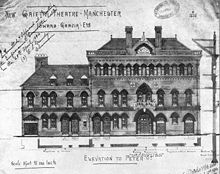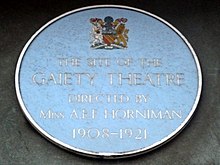
A repertory theatre, also called repertory,rep, true rep or stock, which are also called producing theatres, is a theatre in which a resident company presents works from a specified repertoire, usually in alternation or rotation.

The Abbey Theatre, also known as the National Theatre of Ireland, in Dublin, Ireland, is one of the country's leading cultural institutions. First opening to the public on 27 December 1904, and moved from its original building after a fire in 1951, it has remained active to the present day. The Abbey was the first state-subsidized theatre in the English-speaking world; from 1925 onwards it received an annual subsidy from the Irish Free State. Since July 1966, the Abbey has been located at 26 Lower Abbey Street, Dublin 1.

Wilmslow Road is a major road in Manchester, England, running from Parrs Wood northwards to Rusholme. There it becomes Oxford Road and the name changes again to Oxford Street when it crosses the River Medlock and reaches the city centre.

Annie Elizabeth Fredericka Horniman CH was an English theatre patron and manager. She established the Abbey Theatre in Dublin and founded the first regional repertory theatre company in Britain at the Gaiety Theatre in Manchester. She encouraged the work of new writers and playwrights, including W. B. Yeats, George Bernard Shaw and members of what became known as the Manchester School of dramatists.
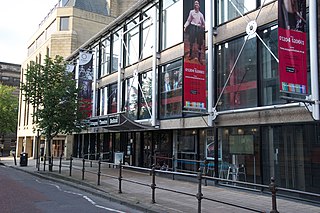
The Octagon Theatre is a producing theatre located in Bolton, Greater Manchester, England.

The Gaiety Theatre is a theatre on South King Street in Dublin, Ireland, off Grafton Street and close to St. Stephen's Green. It specialises in operatic and musical productions, with occasional dramatic shows.
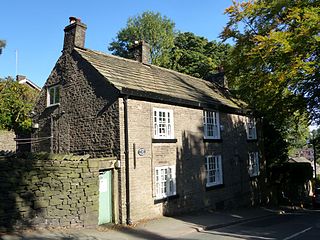
Allan Noble Monkhouse was an English playwright, critic, essayist and novelist.

The Palace Theatre, Manchester, is one of the main theatres in Manchester, England. It is situated on Oxford Street, on the north-east corner of the intersection with Whitworth Street. The Palace and its sister theatre the Opera House on Quay Street are operated by the same parent company, Ambassador Theatre Group. The original capacity of 3,675 has been reduced to its current 1,955.
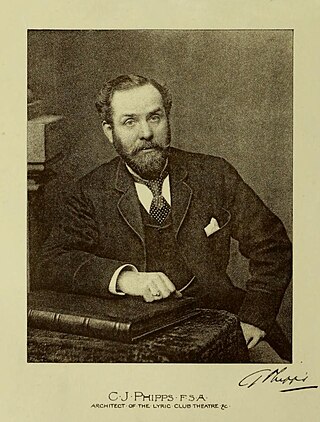
Charles John Phipps was an English architect known for more than 50 theatres he designed in the latter half of the 19th century, including several important ones in London. He is noted for his design of the Theatre Royal, Exeter, which caught fire in 1887, killing 186 visitors.
William Stanley Houghton was an English playwright. He was a prominent member, together with Allan Monkhouse and Harold Brighouse, of a group known as the Manchester School of dramatists. His best known play is Hindle Wakes which was written in 1910 and performed in 1912.

The Culture of Manchester is notable artistically, architecturally, theatrically and musically. Despite being the 5th largest city in the United Kingdom by population and the second largest conurbation, Manchester has been ranked as the second city of the United Kingdom in numerous polls since the 2000s (decade), with an influential culture scene helping to elevate Manchester's importance in the national psyche. This has helped the city's population grow by 20% in the last decade, and made the universities the most popular choices for undergraduate admission.
Gaiety Theatre or Gayety Theatre, and variations may refer to:
Hindle Wakes is a stage play by Stanley Houghton written in 1910. It was first performed in 1912.
Harold Brighouse was an English playwright and author whose best known play is Hobson's Choice. He was a prominent member, together with Allan Monkhouse and Stanley Houghton, of a group known as the Manchester School of dramatists.
The "Manchester School" was a number of playwrights from Manchester, England, who were active in the early 20th century. The leading figures in the group were Harold Brighouse, Stanley Houghton and Allan Monkhouse. They were championed by Annie Horniman, owner of the Gaiety Theatre, Manchester.
Independent Means is a stage play written by Stanley Houghton, a leading member of the Manchester School of dramatists.

The Capitol Theatre was a cinema in Didsbury, Manchester later used as television studios by ITV contractor ABC Weekend TV from 1956 to 1968.
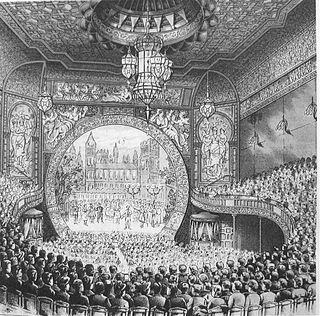
The Bijou Theatre (1882–1943) in Boston, Massachusetts, occupied the second floor of 545 Washington Street near today's Theatre District. Architect George Wetherell designed the space, described by a contemporary reviewer as "dainty." Proprietors included Edward Hastings, George Tyler, and B.F. Keith. Around the 1900s, it featured a "staircase of heavy glass under which flowed an illuminated waterfall." The Bijou "closed 31 December 1943 and was razed in 1951." The building's facade still exists. It is currently a pending Boston Landmark by the Boston Landmarks Commission.
The Theatre Royal, Hanley was a theatre in Stoke-on-Trent, England with a long history.

The Gaiety Theatre and Grand Hotel is a historic theatre and hotel in Zeehan, Tasmania, Australia.
